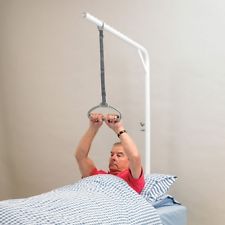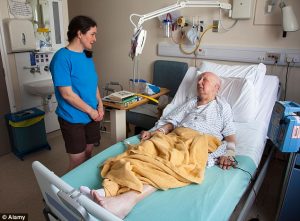Caregiving of a paralyzed elder could be filled with responsibility and a very overwhelming task. This role of caring for a person that is partially paralyzed or completely paralyzed could be made easier for everyone by following a few important tips. First of all it is very important to address any question you have to the doctor and have it answered immediately.
 1. Some tips to care for a paralyzed person: The care to be given varies according to the nature of paralysis; partially paralysis or complete paralysis and the cause like whether it is due to an accident or illness.It is best that you educate yourself on the needs of the elder and how to make life easier by having a talk with patient’s doctors and therapists. Reading books and blogs on the subject would also allow you to be educated on the subject. Remember at the same time that the elder also needs distractions from the circumstances surrounding paralysis.
1. Some tips to care for a paralyzed person: The care to be given varies according to the nature of paralysis; partially paralysis or complete paralysis and the cause like whether it is due to an accident or illness.It is best that you educate yourself on the needs of the elder and how to make life easier by having a talk with patient’s doctors and therapists. Reading books and blogs on the subject would also allow you to be educated on the subject. Remember at the same time that the elder also needs distractions from the circumstances surrounding paralysis.
 2. It would greatly help partially paralyzed patients to be more independent; for example you could fix a monkey bar to the bed to get up if the leg is affected, but the hands are OK. It would also help to do some exercises in the equipment recommended by the occupational therapist. One as a caregiver has to be firm if there is initial resistance and be gentle the same time; it will not only give a psychological boost to the elder, but also gives the care-giver respite.
2. It would greatly help partially paralyzed patients to be more independent; for example you could fix a monkey bar to the bed to get up if the leg is affected, but the hands are OK. It would also help to do some exercises in the equipment recommended by the occupational therapist. One as a caregiver has to be firm if there is initial resistance and be gentle the same time; it will not only give a psychological boost to the elder, but also gives the care-giver respite.

3. The caregiver should regularly make the elder do physiotherapy or general exercises and even massages. Vigorous breathing exercises are important, so are outings every day in the corridor of your floor or the compound of the colony or building. If a patient can be lifted onto a wheelchair, do so and move it out for an evening stroll. If nothing else is possible, a window or balcony with a view would help.
 4. Keep the elder’s mind active by talking to him/her about other family members, listening to the news together and talking about world events. He/she needs to maintain interest in the world around him/her and express one’s view. Encourage the affected elder to laugh as well as people around him/her and watch educational programs together; this will help the paralyzed elder to think of things other than one’s own condition. You could invite friends, neighbors, relatives for an occasional tea; it is good for both the patient and care-givers social health.
4. Keep the elder’s mind active by talking to him/her about other family members, listening to the news together and talking about world events. He/she needs to maintain interest in the world around him/her and express one’s view. Encourage the affected elder to laugh as well as people around him/her and watch educational programs together; this will help the paralyzed elder to think of things other than one’s own condition. You could invite friends, neighbors, relatives for an occasional tea; it is good for both the patient and care-givers social health.
 5. If the patient is bed-ridden, make sure you buy or hire a hospital bed that can be easily raised and lowered; turned over every half to one hour would help prevent bedsores in the elder. Remember bedsores can be easily prevented than cured; check the skin near the hip joints, shoulders, and elbows as well as check with your doctor or nurse to identify redness, tenderness and pain.
5. If the patient is bed-ridden, make sure you buy or hire a hospital bed that can be easily raised and lowered; turned over every half to one hour would help prevent bedsores in the elder. Remember bedsores can be easily prevented than cured; check the skin near the hip joints, shoulders, and elbows as well as check with your doctor or nurse to identify redness, tenderness and pain.
 6. Last but most importantly keep cheerful and smiling; celebrate festivals, birthdays, even go for a program occasionally. This will keep the elder well and would also give you the deep satisfaction of having done your job of care-giving well.
6. Last but most importantly keep cheerful and smiling; celebrate festivals, birthdays, even go for a program occasionally. This will keep the elder well and would also give you the deep satisfaction of having done your job of care-giving well.
Article Source: http://daycare.sulekha.com/care-corner_6-tips-to-care-for-a-paralyzed-elder_blog_8174

